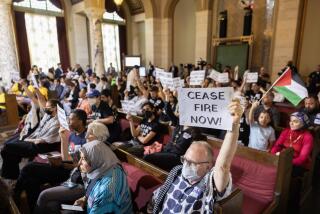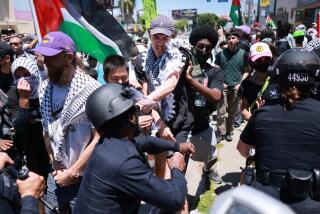Sharpton Joins Another Fight : Controversial New York Minister Receives a Mixed Reaction to His March on L.A.
- Share via
It was shortly before 2 a.m. on Thursday and the Rev. Al Sharpton, fresh off the plane from New York, was raring to go. The controversial preacher and civil rights advocate threw open the drapes in his elegant 14th-floor suite at the Century Plaza Hotel and declared: “So this is how L.A. looks from up here. Where is Gates’ office?”
At that late hour, with a handful of aides and local supporters hanging on his every word, Sharpton wanted to talk strategy. He instructed them to bring a big wooden cross to the march on City Hall he was planning for noon on Friday--Good Friday. The timing, he said, was perfect: “We’ll say it’s the crucifixion of people of color.”
Then Sharpton asked if protesters had been attending court hearings for four Los Angeles police officers indicted in the beating of motorist Rodney G. King. When someone replied they had not, Sharpton shook his head and said: “That’s a strategic mistake. The first thing we do in New York is pack the courtrooms.”
Thus, the flamboyant minister, with his James Brown pompadour, his roly-poly figure and his penchant for stirring up racial discontent, descended upon Los Angeles to add his name to the chorus calling for the ouster of Police Chief Daryl F. Gates.
And on Friday, true to his plan, Sharpton--followed by several hundred protesters--marched from City Hall to Parker Center police headquarters, where he presented a 6-foot-tall cross to a uniformed Los Angeles officer. He vowed to come back again and bring with him the huge crowds that he initially promised but was not able to deliver.
“We came in two days and brought hundreds,” he said. “We’ll come in two weeks and bring thousands.”
To the more mainstream black leaders in Los Angeles, this is hardly a welcome prospect. They have not exactly greeted Sharpton with open arms.
“We don’t need Al Sharpton and his brand of leadership to tell us how to do things in this city,” said Joseph Duff, president of the Los Angeles chapter of the National Assn. for the Advancement of Colored People.
“I suspect he will be roundly rejected in Los Angeles,” said Mark Ridley-Thomas, who heads the local chapter of the Southern Christian Leadership Conference and who spurned an offer to meet with Sharpton.
“I think,” said Mayor Tom Bradley, with characteristic caution, “that what we need is an effort to heal this community, not something that is going to inflame them.”
But healing is not Sharpton’s style. Calm is not his style. “The Rev,” as his entourage calls him, grew up in a rough section of Brooklyn and still likes to shadowbox with his body guard. To Sharpton, life is a street fight.
“I’m the agitator,” he told a television reporter over lunch at a soul food restaurant in Compton. “I’m the guy that keeps the problem center stage. . . . You bring a fighter to a fight. You don’t bring a nun to a fight.”
Controversy--and the press--seem to follow Sharpton wherever he goes, and Los Angeles has been no exception. On Thursday morning, he showed up at the Los Angeles Criminal Courts building, where a judge was to set a trial date for the four police officers indicted in the King beating. The moment he stepped off the elevator and onto the 11th floor, he was nearly crushed by cameramen.
The reporters hammered him with questions, but Sharpton--encircled by the cameras--kept walking and remained silent. As the entire throng moved down the hall with him, sheriff’s deputies tried frantically to break it up.
“There are no press conferences allowed!” one officer shouted.
“We’re not having a press conference,” Sharpton replied.
“Well, you’re blocking our hallway, sir,” another deputy said. “You’ll have to move.”
Finally, the deputies directed Sharpton and his small group--a bodyguard and several local political activists who invited him here--into a private room. When the hearing began, the deputies escorted Sharpton into the courtroom, where he sat quietly in the back as Superior Court Judge Bernard Kamins set May 13 as a trial date.
Later, after a quick news conference outside the courthouse, his aides hustled him into a waiting car and drove him to Phil’s Coffee Shop, two blocks away. Sharpton said he is watching his diet and then ordered a bowl of Fruit Loops cereal. “I’m still a big kid at heart,” he explained.
Over breakfast, the man who has been dubbed “Reverend Sound Bite” for his ability to get on television, blamed reporters for whipping up public hysteria over his visit. He said he would like to point out an irony that he did not mention at the news conference because he thought it would be lost “in a quick situation where you need a sound bite.”
“The irony of it,” he said, “is that it is situations like this that make an Al Sharpton necessary. You know, they ask, ‘Why are you here?’ . . . If it wasn’t for police brutality I would never have had to assume the position I have in the American psyche. So the question is: Why wouldn’t I be here? If I didn’t come, a lot of blacks would say, ‘Well, how come Al Sharpton didn’t come out here?’ It’s like a Catch-22.”
Sharpton was invited to Los Angeles by Elizabeth Munoz, who ran for governor in 1988 on the Peace and Freedom Party ticket, and Lawrence Grigsby, a community activist and lawyer who ran against Rep. Mervyn Dymally (D-Compton) last year.
He says he decided to accept their invitation after he saw Gov. Pete Wilson on television likening the anti-Gates movement to “a lynching.” It simply infuriated him, he says, to hear a white governor use that term to defend a white police chief whose officers had beaten a black man. The Pentecostal minister, who is facing trial on charges of tax evasion, said his trip was financed by the National Action Network, a group he founded to fight racism.
Sharpton, 36, gained notoriety four years ago for his role in the sensational case of Tawana Brawley, a 15-year-old black girl who claimed she had been raped by six white men. Sharpton advised Brawley not to cooperate with investigators. Although a grand jury later concluded that the rape never took place, Sharpton maintains that Brawley’s story was true.
In New York, Sharpton has been involved in countless protests, always demanding justice for blacks. After white youths attacked three young blacks in Howard Beach, Queens, he led massive “Days of Outrage” demonstrations that halted subway service and shut down traffic on the Brooklyn Bridge.
Even Sharpton’s harshest critics acknowledge that he touches a chord among the black community’s poorest and most downtrodden, that he speaks for people who believe they have no one else to represent them. “He tells it like it is,” said one young man who turned out to see Sharpton on Friday. “The other black leaders, they’re politically bought.”
By the time Sharpton arrived at City Hall at 12:45 p.m., the protest had been under way for 45 minutes. Several hundred people--many of whom had come in two buses that Sharpton’s organizers had sent from South-Central Los Angeles--were massed on the steps. Their chant was “No Justice! No Peace!” words that sounded more volatile than the more common refrain, “Gates Gotta Go!”
Sharpton wore his trademark jogging suit--this one black, fuchsia and lime green--and his brass Martin Luther King Jr. medal. (He said he wears the suits whenever he marches or there is a chance that he will be arrested. “No need to dirty up a good suit,” he said.)
As he stepped up to the microphone, someone handed him the cross. “We come to these steps on Good Friday,” he declared, “because 2,000 years ago they crucified Christ, and today they’re crucifying us.”
Carrying the cross on his right shoulder, Sharpton descended the steps and walked out into the middle of Spring Street. Followed by the throng, he marched toward Parker Center, holding up traffic.
As the crowd arrived at police headquarters, there was a moment of uncertainty. The doors were blocked by uniformed officers. Chanting “Free L.A.! Free L.A.!” the protesters were pressing in on Sharpton, who was ringed by eight Nation of Islam bodyguards. One of the guards whispered to Sharpton, asking him what he wanted to do.
“I just want to give them this cross,” he said, “and get out of here.”
More to Read
Sign up for Essential California
The most important California stories and recommendations in your inbox every morning.
You may occasionally receive promotional content from the Los Angeles Times.













